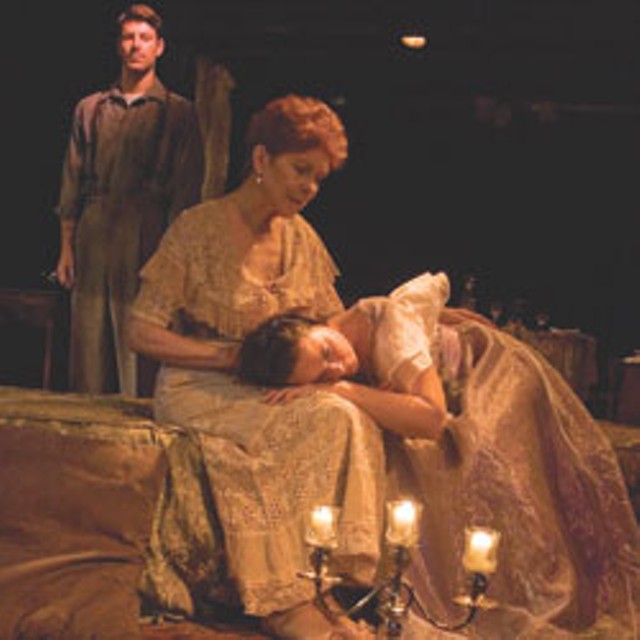Published October 13, 2010 at 9:39 a.m.
A character in the 1959 film Suddenly, Last Summer, written by Tennessee Williams, says, “A poet’s life is his work.” If the author penned these words in sincerity, they may explain why family politics became such a dominant theme in his plays for stage and screen. As he revealed in his semiautobiographical play The Glass Menagerie, Williams was steeped in family drama when he leaped into the life of letters. In the Vermont Stage Company production of the play currently running at FlynnSpace, we’re treated to a dramatic portrait of the artist as a young man poised on that very precipice.
The Glass Menagerie, which earned Williams the New York Drama Critics’ Circle Award in 1945, is widely considered his breakout play. Its enduring celebrity contrasts ironically with the play’s obscure, impoverished setting: the cramped quarters shared by a young man named Tom Wingfield (Tom was Williams’ given name); his sister, Laura; and their mother, Amanda, in 1930s St. Louis.
Jenny Fulton’s scenic design for the VSC production features a fully realized living room — Victrola and all. At one end, a windowless door opens onto a fire-escape landing; at the other end stands a dining-room set. A far wall is adorned with neon lights that suggest the neighborhood’s night spots. The effect is at once confining and inviting — an important quality for the play’s only setting.
Amid this homey clutter, Amanda (Donna Wandrey) flits about, alternating between agitation over Laura’s failure to attract “gentleman callers” and reverie on her own past glories as a debutante. Tom (Craig Maravich), who is the family breadwinner now that the patriarch has abandoned them, sulks and broods, sometimes popping outside for a smoke. Laura (Molly Walsh) suffers her mother’s attention more or less silently, save for occasionally assuring her that, indeed, no gentlemen should be expected to call.
From this relatively low-key situation, director Mark Nash draws engaging, nuanced performances from his cast. One proof of his achievement is that the Wingfields come across as credible family members — no small feat, given that theirs is a house deeply divided.
And for good reason. In her captivating turn as the Wingfield matriarch, Wandrey depicts Amanda as oppressively vigilant in caring for her adult children. No behavior, especially on Tom’s part, is too incidental to merit her criticism — from his table manners to his attire to the general trajectory of his life. Wandrey evokes Amanda’s dual nature with élan: One moment she’s a walking bouquet of nostalgic smiles; the next, she’s the picture of domestic despair, a cast-off wife of negligible economic means whose children can’t stand her. Wandrey is utterly convincing beat for beat, and she brings a shrewd physicality to a character defined by her poise, striking the grande dame’s parlor poses in ways that subtly betray her decline. With a simple slump of her shoulders, she projects abject defeat.
Maravich turns in a deft performance in a multifaceted role. Tom also serves as the play’s narrator, and Maravich takes a refreshingly plainspoken stance, telling the tale truthfully, he alleges, but “in the pleasant disguise of illusion.” The actor’s avoidance of grandiosity helps him slip smoothly into the domestic scenes back behind the fourth wall. His interactions with his mother and sister are nicely modulated; he shows a full range of responses to Amanda’s intrusions, mustering justifiable rage but also more tempered emotions, bemusement as much as belligerence. Tom’s fondness for Laura is clear, although this relationship, too, is colored by his doubts about whether their shared existence — or his own life — can improve its present course.
As shy sister Laura, whose cherished collection of glass animals gives the play its title, Walsh plays the shrinking violet to sympathetic effect — in sharp contrast to her spirited brother and mother. Afflicted with a physical condition that causes her to limp slightly, Laura moves through the house like a cipher. The angst of having failed to meet her mother’s socialite expectations is written in Walsh’s downcast eyes and in surreptitious activities we learn Laura has undertaken outside the home to palliate her mother’s disappointment. Walsh’s portrayal conveys a resignation to spinsterhood. But something in her vacant gaze hints at a wellspring of emotional pain beneath her physical limitations.
Laura’s seeming last shot at companionship outside her circle of miniature glass pals arrives in the person of Jim, Tom’s coworker at the Continental Shoe warehouse. Played with backslapping ebullience by Benjamin Wiggins, Jim embodies an optimism that’s in short supply among the Wingfields and, most important, a confidence to seize the day. When he shows up to dine with the Wingfields, not knowing Tom has arranged the meeting to introduce him to Laura, his presence reminds the family that some people forge ahead while others remain stuck in the past, or in each other’s way. Jim’s head may be in the clouds — he has determined that public-speaking ability is the secret of success — but Wiggins’ performance blends enthusiasm and empathy in a way that inspires hope for what he might bring this broken family. Might.
A decade into the 21st century, we may think we’re not gullible enough to expect salvation from a smooth-talking stranger — except, of course, on the national political stage. Still, The Glass Menagerie should prove compelling to contemporary audiences, even uncomfortably so, for the critical gaze it turns back on them. The play raises the kinds of questions that earned another notable postwar drama, Arthur Miller’s Death of a Salesman, a Pulitzer Prize in 1949. Are we players or pawns in this game we call the American Dream? Is family a sanctuary or a snare on the road to prosperity?
Coincidentally, the Weston Playhouse’s laudable production of Death of a Salesman played the Flynn MainStage during the opening weekend of VSC’s Glass Menagerie. A comparison of the two plays is apt here, and not just because they both feature a delusional parent spurring progeny on to success while denying his or her own dysfunction. More to the point, each work testifies to the cruel world’s hand in forging flawed characters. We can forgive these parents their methods, but we can’t forget the pressures bearing down on the homes they struggle to maintain. We can’t forget those pressures because we feel them acutely today.
Rightfully, then, the American theater esteems Williams and Miller for their unflinching portraits of American Dreamers hanging on for dear life. With its current production of The Glass Menagerie, VSC earns praise for the worthy caretaking of an American classic.
Want to see for yourself?
The Glass Menagerie, directed by Mark Nash, produced by Vermont Stage Company at FlynnSpace, Burlington. October 13 through 24, Wednesday through Saturday at 7:30 p.m., Saturday and Sunday at 2 p.m. $27-32.50.
More By This Author
Speaking of...
-

Executive Director Kurt Thoma Leaves Barre Opera House
Mar 5, 2024 -

Vermonter's Musical Bound for Broadway With Hillary Clinton as a Producer
Oct 25, 2023 -

Phantom Theater Finds New Winter Venue in Waitsfield
Oct 13, 2023 -

Double E 2023 Summer Concert Series Kicks Off With the Wailers
Mar 17, 2023 -

Off Center for the Dramatic Arts to Reopen in the New North End
Sep 23, 2022 - More »
Comments
Comments are closed.
From 2014-2020, Seven Days allowed readers to comment on all stories posted on our website. While we've appreciated the suggestions and insights, right now Seven Days is prioritizing our core mission — producing high-quality, responsible local journalism — over moderating online debates between readers.
To criticize, correct or praise our reporting, please send us a letter to the editor or send us a tip. We’ll check it out and report the results.
Online comments may return when we have better tech tools for managing them. Thanks for reading.















































